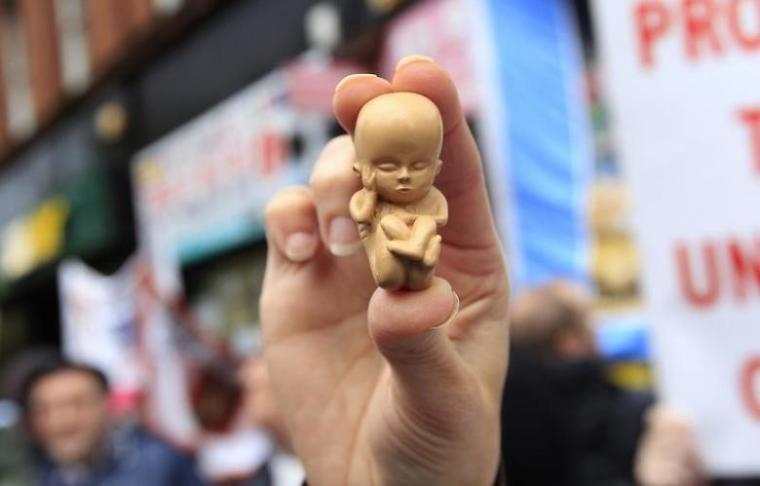South Carolina lawmakers considering bill that would recognize personhood of the unborn

South Carolina lawmakers are currently considering a legislation that would recognize the personhood of unborn children starting at fertilization.
The Personhood Act of South Carolina or S.217 was introduced by Lt. Gov. Kevin Bryant while he was still a state senator. He testified briefly in favor of the bill during the state Senate subcommittee hearing last week.
"This legislation directly underscores and recognizes those unalienable rights endowed by the Creator: the right to life, the right to liberty, and the right to the pursuit of happiness for the baby girl and the baby boy that have yet to be born," Bryant told the subcommittee.
One of those who testified against the bill was Katie Sacra, a mother who told the Senate panel about her trials and troubles raising a child with a painful, lethal disorder.
"I promise you, no matter how hard you try to imagine, you cannot begin to understand the magnitude of suffering this has caused in our lives," she said, as reported by WISTV.
She narrated that she had to terminate her pregnancy more than once because of the disorder, and she maintained that she was grateful that she was able to make the decision.
Bryant's bill states that all life begins at conception, and it would outlaw all abortions, with no exceptions for cases of rape, incest or to save the life of the mother, according to WSPA.
"Stating that human life begins at fertilization is really not consistent with scientific fact. Both sperm and egg are alive prior to fertilization. Although there is DNA added, no real new life is created," Dr. Michael Slowey of Coastal Fertility Specialists in Mt. Pleasant told the senators.
Planned Parenthood representatives argued that the bill would pose health risks for women suffering from life-threatening pregnancies.
Vicki Ringer of Planned Parenthood South Atlantic criticized the legislation for the lack of exceptions and noted that it would also ban the destruction of embryos from infertility treatments.
Supporters of the bill believe that there should be a voice for the unborn who do not have one and that they deserve the same due process as adults.
The hearing was packed to standing room only, and many residents signed up to speak for and against the bill, but there was not enough time to hear them all. Another hearing has been scheduled before a vote takes place.
 Christians don't have to affirm transgenderism, but they can’t express that view at work: tribunal
Christians don't have to affirm transgenderism, but they can’t express that view at work: tribunal Archaeology discovery: Medieval Christian prayer beads found on Holy Island
Archaeology discovery: Medieval Christian prayer beads found on Holy Island Presbyterian Church in America votes to leave National Association of Evangelicals
Presbyterian Church in America votes to leave National Association of Evangelicals Over 50 killed in 'vile and satanic' attack at Nigerian church on Pentecost Sunday
Over 50 killed in 'vile and satanic' attack at Nigerian church on Pentecost Sunday Ukrainian Orthodox Church severs ties with Moscow over Patriarch Kirill's support for Putin's war
Ukrainian Orthodox Church severs ties with Moscow over Patriarch Kirill's support for Putin's war Islamic State kills 20 Nigerian Christians as revenge for US airstrike
Islamic State kills 20 Nigerian Christians as revenge for US airstrike Man who served 33 years in prison for murder leads inmates to Christ
Man who served 33 years in prison for murder leads inmates to Christ


 Nigerian student beaten to death, body burned over ‘blasphemous’ WhatsApp message
Nigerian student beaten to death, body burned over ‘blasphemous’ WhatsApp message 'A new low': World reacts after Hong Kong arrests 90-year-old Cardinal Joseph Zen
'A new low': World reacts after Hong Kong arrests 90-year-old Cardinal Joseph Zen Iran sentences Christian man to 10 years in prison for hosting house church worship gathering
Iran sentences Christian man to 10 years in prison for hosting house church worship gathering French Guyana: Pastor shot dead, church set on fire after meeting delegation of Evangelicals
French Guyana: Pastor shot dead, church set on fire after meeting delegation of Evangelicals ‘Talking Jesus’ report finds only 6% of UK adults identify as practicing Christians
‘Talking Jesus’ report finds only 6% of UK adults identify as practicing Christians Mission Eurasia ministry center blown up in Ukraine, hundreds of Bibles destroyed: 'God will provide'
Mission Eurasia ministry center blown up in Ukraine, hundreds of Bibles destroyed: 'God will provide' Church holds service for first time after ISIS desecrated it 8 years ago
Church holds service for first time after ISIS desecrated it 8 years ago Burger King apologizes for 'offensive campaign' using Jesus' words at the Last Supper
Burger King apologizes for 'offensive campaign' using Jesus' words at the Last Supper Uganda: Muslims abduct teacher, burn him inside mosque for praying in Christ’s name
Uganda: Muslims abduct teacher, burn him inside mosque for praying in Christ’s name